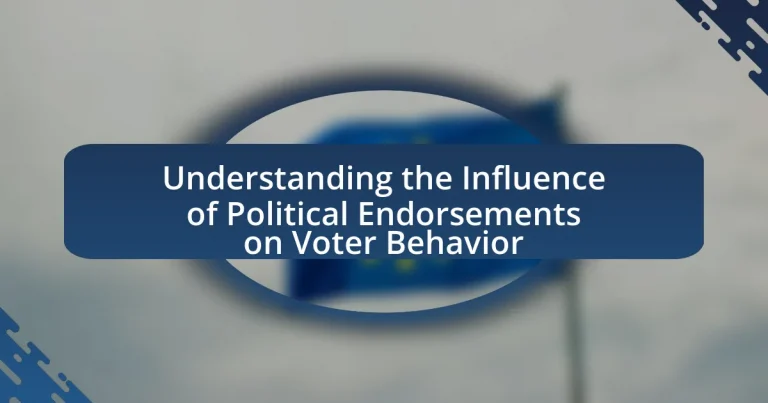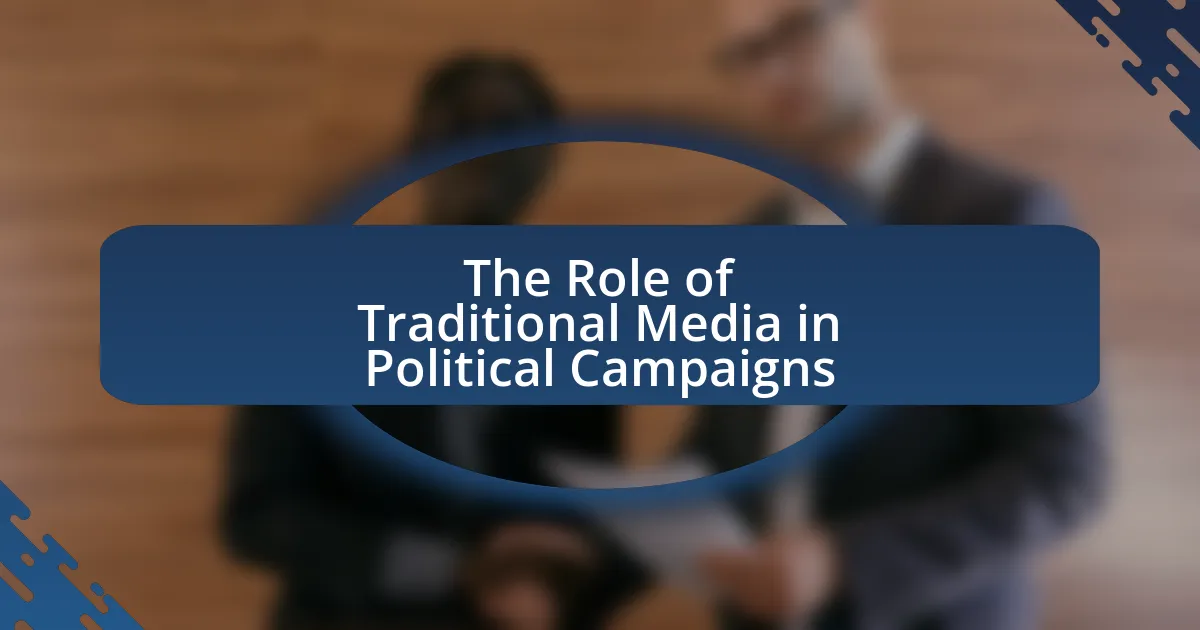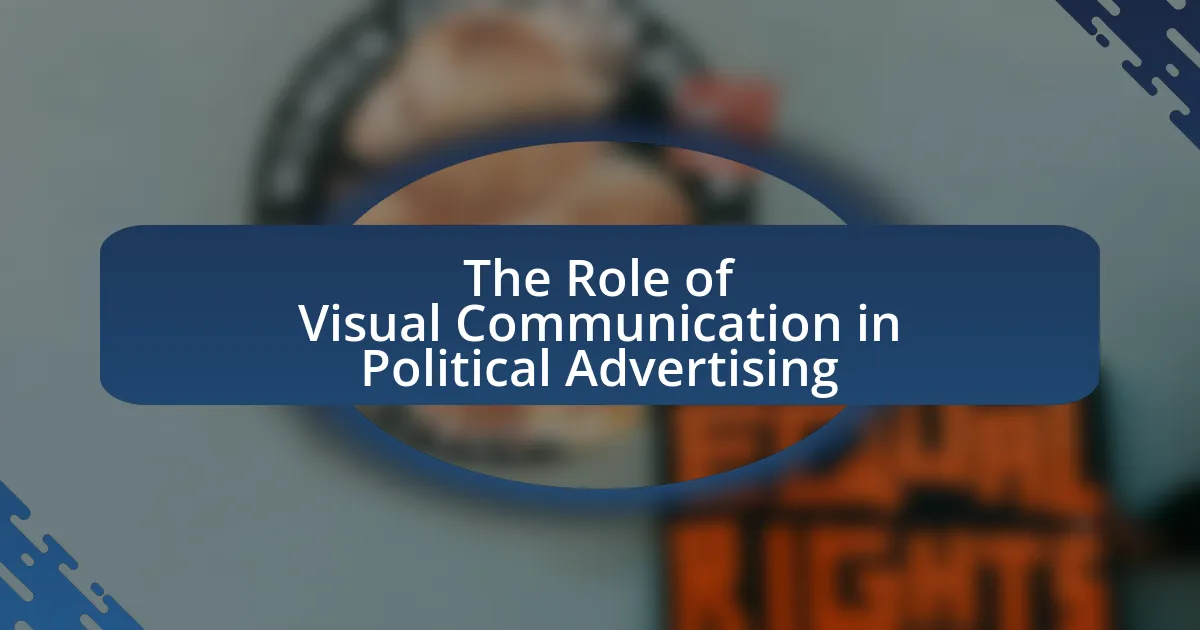Political endorsements are formal declarations of support for candidates or political parties, significantly influencing elections by shaping public perception and voter behavior. This article explores the role of endorsements in enhancing candidate credibility, mobilizing voter demographics, and impacting campaign funding. It examines how endorsements from trusted figures and organizations sway undecided voters, the psychological mechanisms behind voter responses, and the varying effects of endorsements across different demographics. Additionally, the article categorizes types of endorsements and discusses strategies candidates can employ to leverage endorsements effectively in their campaigns.
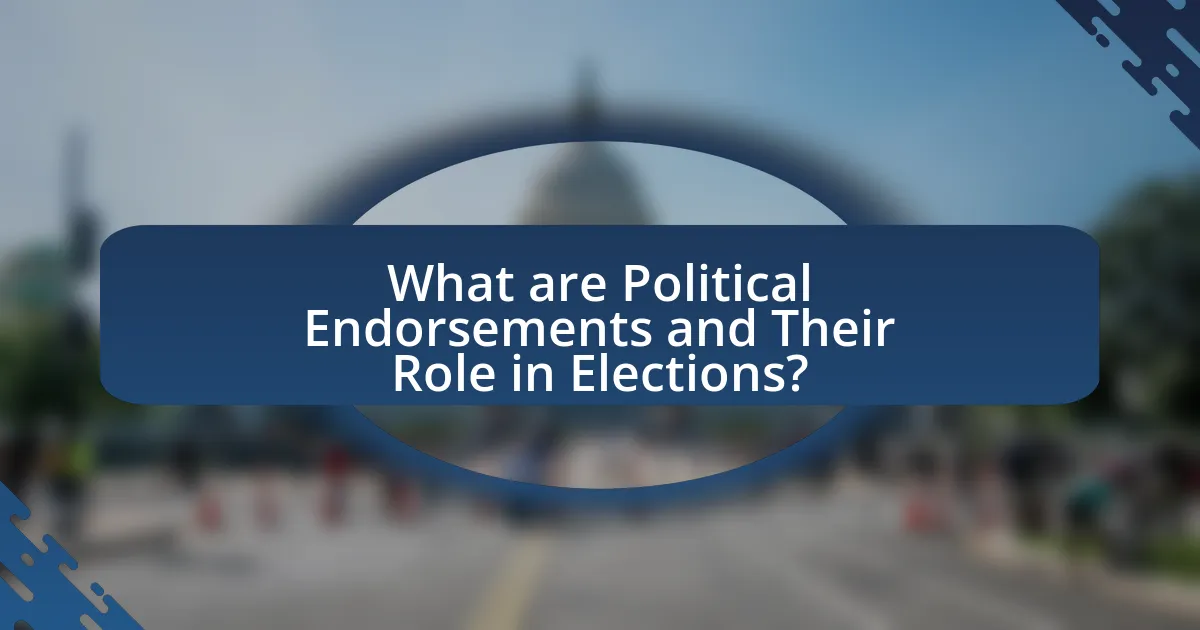
What are Political Endorsements and Their Role in Elections?
Political endorsements are formal declarations of support for a candidate or political party by individuals, organizations, or influential figures. These endorsements play a significant role in elections by shaping public perception, influencing voter behavior, and enhancing a candidate’s credibility. For instance, endorsements from well-known political figures or organizations can sway undecided voters and mobilize supporters, as seen in the 2008 U.S. presidential election when Barack Obama received endorsements from prominent figures like Oprah Winfrey, which contributed to his appeal and voter turnout.
How do Political Endorsements Influence Voter Perception?
Political endorsements significantly influence voter perception by enhancing the credibility and appeal of candidates. When a respected figure or organization endorses a candidate, it can lead to increased trust and favorability among voters, as seen in studies indicating that endorsements can sway undecided voters. For instance, research conducted by the Pew Research Center found that 60% of voters consider endorsements from political figures important in their decision-making process. This demonstrates that endorsements not only shape perceptions but also have the potential to alter voting behavior by aligning candidates with trusted entities.
What factors contribute to the credibility of an endorsement?
The credibility of an endorsement is primarily influenced by the endorser’s expertise, trustworthiness, and relevance to the audience. Expertise refers to the endorser’s knowledge or experience in the subject matter, which enhances the perceived reliability of their endorsement. Trustworthiness involves the endorser’s integrity and honesty, as endorsements from individuals perceived as genuine are more likely to be accepted by the audience. Relevance pertains to the endorser’s connection to the audience’s values and beliefs, making the endorsement more impactful. Research indicates that endorsements from credible sources can significantly sway voter behavior, as demonstrated in studies showing that voters are more likely to support candidates endorsed by respected figures within their community or field.
How do endorsements shape the narrative around candidates?
Endorsements significantly shape the narrative around candidates by influencing public perception and credibility. When a respected individual or organization endorses a candidate, it often lends legitimacy and can sway undecided voters. For example, endorsements from prominent political figures or organizations can lead to increased media coverage, framing the candidate as a viable choice. Research indicates that candidates who receive endorsements from well-known figures tend to experience a boost in polling numbers, as seen in the 2020 U.S. presidential election where endorsements from influential politicians helped shape voter opinions and mobilize support.
Why are Political Endorsements Important for Candidates?
Political endorsements are important for candidates because they enhance credibility and increase visibility among voters. Endorsements from influential figures or organizations can signal to voters that a candidate is trustworthy and has the support of respected leaders, which can sway undecided voters. For instance, a study by the Pew Research Center found that 60% of voters consider endorsements when making their decisions, indicating their significant impact on voter behavior. Additionally, endorsements can mobilize specific voter demographics, as seen in the 2020 election when endorsements from prominent figures helped candidates gain traction in key states.
What advantages do candidates gain from receiving endorsements?
Candidates gain significant advantages from receiving endorsements, including increased credibility, enhanced visibility, and improved voter trust. Endorsements from respected figures or organizations can validate a candidate’s qualifications and positions, making them more appealing to voters. For instance, a study by the Pew Research Center found that 70% of voters consider endorsements when making their decisions, indicating that endorsements can sway public opinion and increase a candidate’s chances of winning. Additionally, endorsements often lead to greater media coverage, which amplifies the candidate’s message and outreach efforts.
How do endorsements affect campaign funding and resources?
Endorsements significantly enhance campaign funding and resources by increasing a candidate’s credibility and visibility. When a prominent figure or organization endorses a candidate, it often leads to a surge in donations, as supporters are more likely to contribute to a campaign perceived as viable and supported by influential allies. For instance, a study by the Pew Research Center found that candidates who receive endorsements from well-known political figures can see an increase in fundraising by up to 30%. Additionally, endorsements can attract more volunteers and resources, as organizations and individuals rally behind a candidate they believe has a stronger chance of winning, thereby amplifying the campaign’s overall reach and effectiveness.
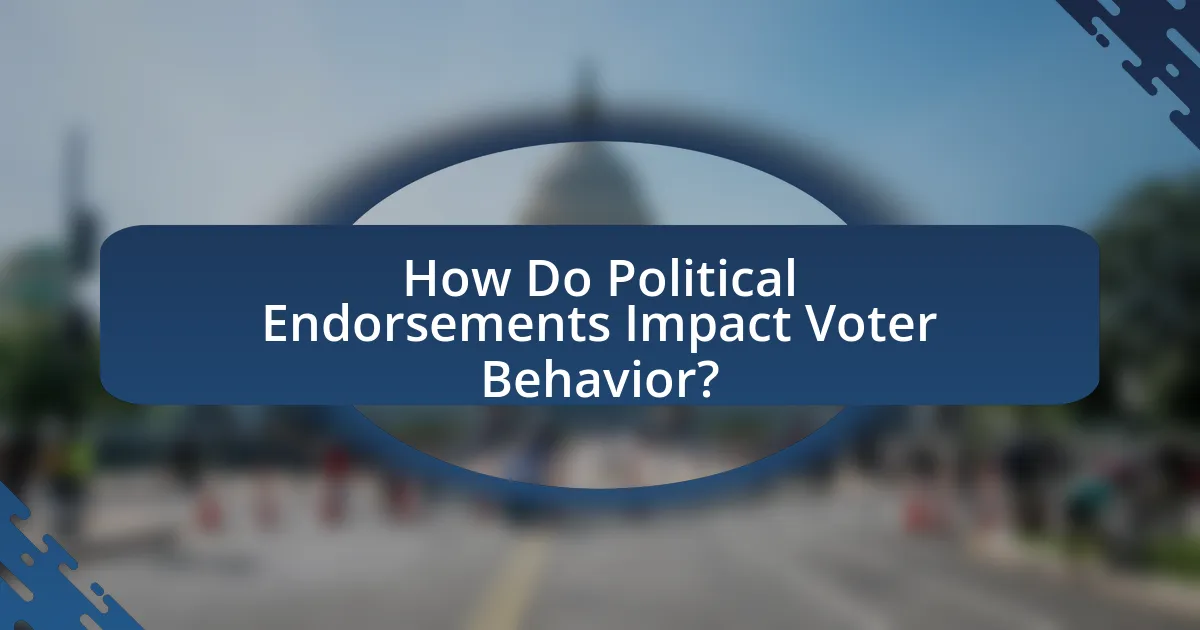
How Do Political Endorsements Impact Voter Behavior?
Political endorsements significantly influence voter behavior by enhancing candidate credibility and shaping public perception. Research indicates that endorsements from trusted figures or organizations can sway undecided voters, as they often rely on these endorsements to make informed decisions. For instance, a study by the Pew Research Center found that 60% of voters consider endorsements important when choosing a candidate. Furthermore, endorsements can mobilize specific voter demographics, as seen in the 2020 U.S. presidential election, where endorsements from prominent figures like Barack Obama and Bernie Sanders energized their respective bases, leading to increased voter turnout.
What Psychological Mechanisms Underlie Voter Responses to Endorsements?
Voter responses to endorsements are primarily influenced by social proof, cognitive dissonance, and the halo effect. Social proof suggests that individuals are more likely to support a candidate endorsed by trusted figures, as they perceive this as validation of their choice. Cognitive dissonance occurs when voters experience discomfort from conflicting beliefs, leading them to align their views with those of endorsers to reduce this tension. The halo effect causes voters to attribute positive qualities to a candidate based on the endorsement, enhancing their overall perception. Research indicates that endorsements can significantly sway undecided voters, as demonstrated in studies showing that candidates endorsed by popular figures often see a measurable increase in support, highlighting the effectiveness of these psychological mechanisms in shaping voter behavior.
How does social proof influence voter decision-making?
Social proof significantly influences voter decision-making by shaping perceptions of candidate popularity and credibility. When voters observe others supporting a particular candidate, they are more likely to align their choices with that perceived consensus, often believing that widespread support indicates a candidate’s viability and trustworthiness. Research by Cialdini et al. (2006) highlights that individuals tend to rely on social cues, such as endorsements from peers or public figures, to guide their decisions, particularly in uncertain situations like elections. This phenomenon is evident in political campaigns where endorsements from influential figures can lead to increased voter turnout and support, as seen in the 2008 U.S. presidential election, where endorsements from celebrities and political leaders significantly impacted voter perceptions and behaviors.
What role does trust play in the effectiveness of endorsements?
Trust is a critical factor in the effectiveness of endorsements, as it directly influences how voters perceive and accept the endorsed candidate or message. When voters trust the endorser, they are more likely to view the endorsement as credible and persuasive, leading to increased likelihood of supporting the endorsed candidate. Research indicates that endorsements from trusted figures can significantly sway voter opinions; for instance, a study published in the Journal of Politics found that endorsements from well-respected community leaders can enhance a candidate’s appeal by up to 20%. This demonstrates that the level of trust in the endorser correlates with the endorsement’s impact on voter behavior.
How Do Different Demographics Respond to Political Endorsements?
Different demographics respond to political endorsements in varied ways, influenced by factors such as age, race, gender, and socioeconomic status. For instance, younger voters tend to be more swayed by endorsements from celebrities and social media influencers, while older voters may place greater trust in endorsements from traditional political figures or organizations. Research indicates that racial and ethnic minorities often respond positively to endorsements from leaders within their own communities, as these endorsements can enhance perceived credibility and relatability. Additionally, women voters may be more influenced by endorsements that emphasize social issues, reflecting their priorities. A study by the Pew Research Center found that 60% of voters reported that endorsements from trusted figures significantly impacted their voting decisions, highlighting the importance of demographic alignment in the effectiveness of political endorsements.
What variations exist in endorsement impact across age groups?
Endorsement impact varies significantly across age groups, with younger voters typically showing a higher responsiveness to endorsements compared to older voters. Research indicates that individuals aged 18-29 are more likely to be influenced by endorsements, as they often seek validation from trusted figures when forming political opinions. In contrast, older voters, particularly those over 65, tend to rely more on personal experience and established beliefs, making them less susceptible to the sway of endorsements. A study by the Pew Research Center found that 62% of younger voters reported being influenced by endorsements, while only 38% of older voters indicated the same. This disparity highlights the importance of tailoring endorsement strategies to effectively engage different age demographics in political campaigns.
How do cultural backgrounds influence the reception of endorsements?
Cultural backgrounds significantly influence the reception of endorsements by shaping individuals’ values, beliefs, and perceptions of credibility. For instance, in collectivist cultures, endorsements from community leaders or family members are often viewed as more trustworthy compared to individualistic cultures, where personal achievement may be prioritized. Research indicates that endorsements resonate differently based on cultural context; a study published in the Journal of Cross-Cultural Psychology found that individuals from high-context cultures are more likely to respond positively to endorsements that align with their social norms and group identity. This demonstrates that cultural frameworks dictate how endorsements are interpreted and valued, ultimately affecting voter behavior.
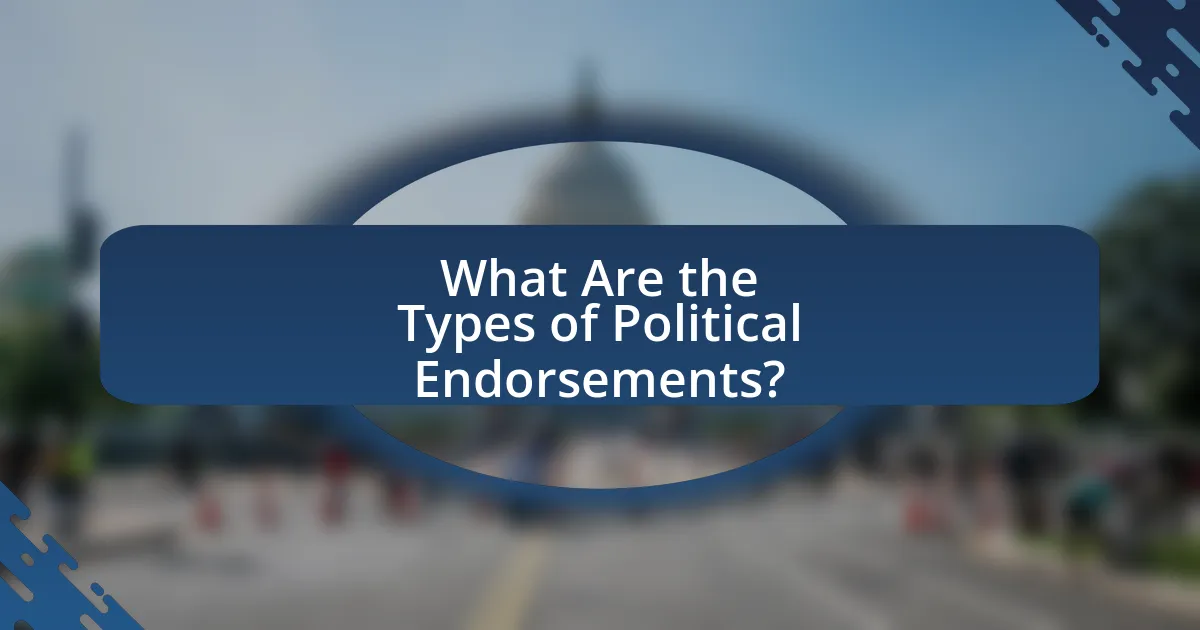
What Are the Types of Political Endorsements?
Political endorsements can be categorized into several types, including individual endorsements, organizational endorsements, and party endorsements. Individual endorsements come from prominent figures, such as celebrities or political leaders, who publicly support a candidate. Organizational endorsements are provided by groups, such as labor unions or advocacy organizations, which often represent specific interests or demographics. Party endorsements occur when a political party officially supports a candidate, typically during primary elections, which can significantly influence voter perception and behavior. These types of endorsements play a crucial role in shaping public opinion and can impact election outcomes by lending credibility and visibility to candidates.
How do Institutional Endorsements Differ from Individual Endorsements?
Institutional endorsements differ from individual endorsements primarily in their source and perceived authority. Institutional endorsements come from organizations, such as political parties, unions, or advocacy groups, which often carry significant weight due to their established credibility and resources. For example, a major political party’s endorsement can mobilize a large voter base and influence public opinion more effectively than an individual endorsement. In contrast, individual endorsements are made by single persons, such as public figures or community leaders, and while they can be impactful, they typically lack the broader organizational backing that institutional endorsements provide. Research indicates that endorsements from institutions can lead to increased voter turnout, as seen in studies analyzing the effects of union endorsements on election outcomes.
What are the characteristics of endorsements from political parties?
Endorsements from political parties are characterized by their ability to signal support for a candidate, influence voter perceptions, and mobilize party members. These endorsements often reflect the party’s ideological alignment with the candidate, showcasing shared values and policy goals. For instance, endorsements can enhance a candidate’s credibility and visibility, as seen in the 2020 U.S. presidential election where endorsements from prominent figures within the Democratic Party significantly boosted Joe Biden’s campaign. Additionally, endorsements can lead to increased fundraising and volunteer support, as party infrastructure mobilizes resources to back the endorsed candidate.
How do endorsements from influential individuals affect voter behavior?
Endorsements from influential individuals significantly affect voter behavior by enhancing the credibility and appeal of a candidate. Research indicates that endorsements can sway undecided voters, as they often rely on the opinions of trusted figures to make informed decisions. For instance, a study published in the American Political Science Review found that endorsements from well-known politicians or celebrities can increase a candidate’s support by as much as 10%. This influence is particularly pronounced among younger voters who may prioritize social validation from influential figures. Thus, endorsements serve as a powerful tool in shaping public perception and voter choices during elections.
What Role Do Media Endorsements Play in Elections?
Media endorsements play a significant role in elections by influencing voter perceptions and behaviors. Endorsements from reputable media outlets can enhance a candidate’s credibility and visibility, often swaying undecided voters. Research indicates that voters are more likely to support candidates endorsed by trusted media sources, as these endorsements can serve as a heuristic for evaluating candidates. For instance, a study by the Pew Research Center found that 70% of voters consider media endorsements important when making their electoral decisions. This demonstrates that media endorsements can effectively shape public opinion and impact election outcomes.
How do media endorsements shape public opinion?
Media endorsements shape public opinion by influencing perceptions and attitudes toward candidates or issues. When reputable media outlets endorse a candidate, they lend credibility and visibility, which can sway undecided voters. Research indicates that endorsements can increase a candidate’s support by as much as 10% in polls, as seen in studies conducted during election cycles, such as the 2016 U.S. presidential election where endorsements from major newspapers significantly impacted voter preferences. This effect occurs because endorsements often frame the narrative around a candidate, highlighting their strengths and aligning them with the values of the audience, thus shaping public discourse and opinion.
What impact do endorsements from major news outlets have on voter turnout?
Endorsements from major news outlets significantly increase voter turnout. Research indicates that when reputable media organizations endorse candidates, it can enhance the perceived legitimacy and appeal of those candidates, motivating more individuals to participate in elections. For instance, a study by the Pew Research Center found that voters who are aware of endorsements are more likely to feel informed and engaged, leading to higher turnout rates. Additionally, endorsements can influence undecided voters by providing them with trusted opinions, further contributing to increased electoral participation.
What Strategies Can Candidates Use to Leverage Endorsements Effectively?
Candidates can leverage endorsements effectively by strategically aligning them with their campaign messaging and target demographics. By showcasing endorsements from influential figures or organizations that resonate with their voter base, candidates can enhance their credibility and appeal. For instance, a candidate endorsed by a popular local leader can attract voters who value community representation. Additionally, candidates should actively promote these endorsements through various channels, such as social media, press releases, and campaign events, to maximize visibility and impact. Research indicates that endorsements can significantly sway undecided voters, as seen in the 2020 U.S. presidential election, where endorsements from key figures played a crucial role in shaping public perception and voter decisions.
How can candidates identify and approach potential endorsers?
Candidates can identify potential endorsers by researching individuals or organizations that align with their values and have influence within their target demographic. This can include community leaders, local business owners, or influential activists who share similar political goals. To approach these potential endorsers, candidates should initiate contact through personalized communication, highlighting shared interests and the mutual benefits of the endorsement. Evidence shows that endorsements from respected figures can significantly sway voter behavior, as seen in studies indicating that voters are more likely to support candidates endorsed by trusted community members.
What are best practices for integrating endorsements into campaign messaging?
Best practices for integrating endorsements into campaign messaging include strategically selecting endorsers who align with the campaign’s values and target audience. This alignment enhances credibility and relatability, making the endorsement more impactful. Additionally, campaigns should prominently feature endorsements in various formats, such as videos, social media posts, and press releases, to maximize visibility and engagement. Research indicates that endorsements from trusted figures can significantly sway undecided voters, as demonstrated in studies showing that 70% of voters are influenced by endorsements from local leaders. Furthermore, campaigns should ensure that the messaging surrounding endorsements is consistent and reinforces the overall campaign narrative, thereby creating a cohesive and persuasive message that resonates with voters.
